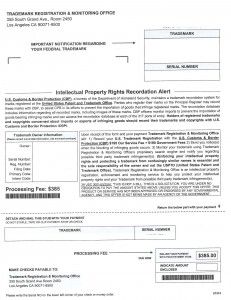By Daniel Davidson
The U.S. Patent and Trademark Office is warning owners of patent and trademark registrations to be cautious when it comes to solicitations received in the mail. The USPTO has received numerous complaints from patent and trademark owners regarding solicitations that are deceptive and request that money be sent to them to monitor the maintenance of the registrations.
The solicitations that the USPTO speak of may look official and even contain language to induce a patent or trademark owner into paying a fee “due” for the required maintenance fees that the USPTO charges, but they are nothing of the sort. Patent and trademark holders should be aware that there are required fees to maintain a registration and there are certain dates that these fees must be paid on. All of that information can be obtained on the USPTO website, www.uspto.gov. Unfortunately, many times (because I’m sure there are private companies that will monitor and assist in maintaining a patent or trademark) the company will not assist in maintaining your patent or trademark and simply pocket the money.
Therefore, a patent and trademark holder should be aware that any official correspondence that would be coming from the U.S. Patent and Trademark Office will come from their Alexandria, Virginia address. Also, the USPTO sends official correspondence by email from the domain “@uspto.gov.” If correspondence is received from any other address claiming to be affiliated with the USPTO and requesting fees, it should be disregarded (unless, of course, it is from your attorney that you have requested to monitor your registration).
There are ways to make the USPTO aware of any scam solicitation. Through the USPTO website at http://www.uspto.gov/trademarks/solicitation_warnings.jsp, the solicitation can be uploaded and sent with some requested information. Complaints can also be filed with the Federal Trade Commission at www.ftc.gov. The Federal Trade Commission will not prosecute individual complaints, but they will take steps in investigating and file complaints on behalf of consumers as a whole.


